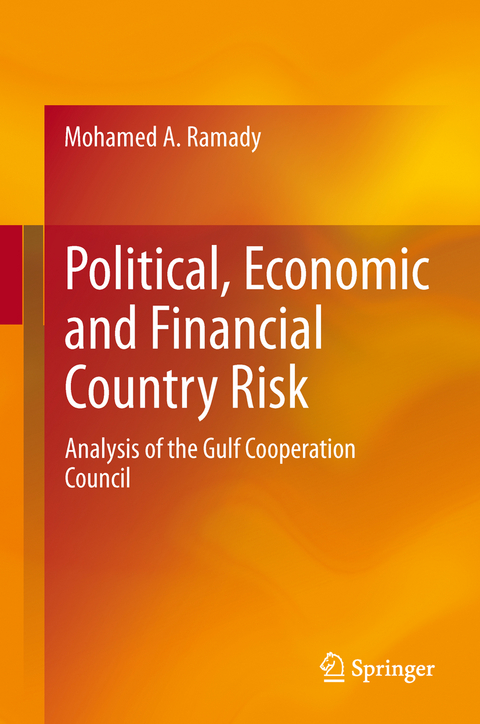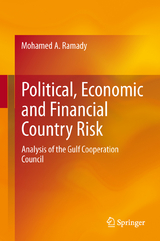Political, Economic and Financial Country Risk
Springer International Publishing (Verlag)
978-3-319-02176-8 (ISBN)
By comparison, with some exceptions, the six countries comprising the Gulf Cooperation Council have been relatively unaffected by the general turbulence and uncertainties lapping around them. However, geopolitical shifts involving global superpower rivalries, combined with revolutionary breakthroughs in the non-conventional hydrocarbon energy sector are threatening to challenge the importance of the Arabian Gulf as the world's leading suppliers of energy, putting their economies under fiscal stress. The author examines such challenges by:
- Providing the first in-depth statistical analytical assessment of the GCC countries using monthly data over the period 2001 -2013 for the three risk categories- economic, financial and political risks- and their sub -components so as to enable policymakers enhance components with low risk , while addressing components with perceived higher risk,
- Assessing FDI and capital inflows and outflows before and after the "Arab Spring" , and how to encourage FDI inflows,
- Inter -Arab and GCC trade and synergies in power transmission , transportation links and establishing new hubs of centers of manufacturing excellence ,
- Exploring private sector-led growth models to reduce forecasted unemployment.
Being complacent is not an option for the GCC. The aim of the book is that having a better understanding of each of the GCC countries' individual risk parameters will enable the GCC meet future challenges and reduce the chances of a negative 'Arab Spring' occurring in the region.
Mohamed Ramady is a Visiting Associate Professor at the Department of Finance and Economics, King Fahd University of Petroleum and Minerals. His main research interests are the economics of the Middle East and Saudi Arabia in particular, as well as money and banking He also held senior positions with international financial institutions in the Arabian Gulf and Europe.
Mohamed Ramady is Visiting Associate Professor at the Department of Finance and Economics, King Fahd University of Petroleum and Minerals. His main research interests are the economies of the Middle East and Saudi Arabia in particular, as well as money and banking. He also held senior positions with international financial institutions in the Arabian Gulf and Europe.
Part I.- Foundation and Key concepts.- GCC Country Risk andthe " Arab Spring ".- Country Risk assessments.- Part II : Indicators of Country Risk analysis.- Indicatorsof Financial Risk.- Determinants of Country economic risk.- Country politicalrisk contents.- Part III : GCCCountry economic , financial andpolitical risk analysis.- Kingdom of Saudi Arabia risk analysis.- State of Kuwait risk analysis.- State of Qatar risk analysis.- Kingdom ofBahrain risk analysis.- Sultanate ofOman risk analysis.- United ArabEmirates risk analysis.- GCC CompositeRisk : Political risk at the core.- Part IV: Current Challenges.- GCC Inwardand Outward Foreign Direct Investment and Capital Flows.- GCC countries and the"Arab Spring: : shielded but notimmune.- Conclusions and Recommendations.- Bibliography.- Index .
lt;p>From the reviews:
"Political, Economic, and Financial Country Risk. Analysis of the Gulf Cooperation Council is an extremely resourceful book, offering a wide range of information not only on the GCC states but also on widespread rating practices. To a certain degree, the book can be used as a handbook ... . practitioners could also benefit from more links between the single facts that would at times make it easier to get a bigger picture of the issues at stake." (Annika Kropf, Review of Middle East Economics and Finance, Vol. 10 (1), 2014)
| Erscheint lt. Verlag | 30.10.2013 |
|---|---|
| Zusatzinfo | XXII, 281 p. 95 illus. |
| Verlagsort | Cham |
| Sprache | englisch |
| Maße | 155 x 235 mm |
| Gewicht | 600 g |
| Themenwelt | Sozialwissenschaften ► Politik / Verwaltung ► Europäische / Internationale Politik |
| Sozialwissenschaften ► Politik / Verwaltung ► Vergleichende Politikwissenschaften | |
| Wirtschaft ► Volkswirtschaftslehre ► Wirtschaftspolitik | |
| Schlagworte | arab spring • Gulf Cooperation Council • Investment • Middle East • Oil • risk analysis |
| ISBN-10 | 3-319-02176-1 / 3319021761 |
| ISBN-13 | 978-3-319-02176-8 / 9783319021768 |
| Zustand | Neuware |
| Haben Sie eine Frage zum Produkt? |
aus dem Bereich




